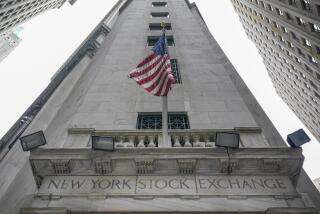Rough Ride Looms for British Firms
- Share via
BIRMINGHAM, England — The Rover Group’s four-wheel-drive automobile factory in suburban Solihull represents Britain’s economic hope: The high-tech plant is churning out an array of off-road vehicles, from the upscale Range Rover to the new smaller, lighter Freelander.
But 12 miles away, Rover’s Longbridge family-car plant represents reality: employment and production cutbacks. They are hallmarks of a recession in manufacturing that many here fear will affect the rest of the British economy.
A familiar culprit, the Asian crisis, is hurting exports and triggering closures of foreign-owned factories here, while Britain’s strong currency is helping competitors in continental Europe at the expense of firms in England.
“We’re getting a double whammy,” company spokesman Vincent Hammersley said. “When the Japanese economy collapses it hurts us. At the same time, the pound is about 30% overvalued against European currencies. We’re selling the same cars for the same price but making less.”
Though other European economies have begun to slow in the face of the global economic turmoil, hope remains strong that the continent--still on the upside of a cycle--will avoid a downturn.
But weakness in Britain is another fissure in the world economy as industrial nations scramble to sustain growth. Britain’s six-year boom is coming to an end. Overall growth is slowing, and unemployment, which has been under 5%, is expected to rise. The question is how rough the landing will be.
“Soft landings are the dream of policymakers but are not always easy to manage,” said David Walton, Britain economist at Goldman Sachs, the investment bank and securities firm.
Rover, which was bought by Germany’s BMW in 1994, is trying to manage without layoffs. It is cutting 1,500 of its 40,000 jobs in Britain through retirement and terminating temporary contracts. It is putting the high-volume plant at Longbridge on a four-day week and closing down for an extra two weeks in December to pull 12,000 automobiles out of production.
Rover’s predicament is common throughout British manufacturing, which accounts for about a quarter of the economy and has been in a recession, or contraction, for at least a year.
Economists say that consumer spending and the hearty service sector could keep Britain from nose-diving into an across-the-board recession. London’s chic restaurants and fine department stores are full, they note hopefully. Britons are booking holidays and buying new cars.
Many of them are Fiats, Renaults and Volkswagens instead of Rovers, but as Hammersley pointed out, “people are lining up” to pay $29,000 for the Freelander.
But even these mainstays of the economy are showing signs of weakening amid uncertainties about global financial markets. Shoppers are starting to think twice before spending, cutting growth in retail sales by half to 2.5%. Investment banks that are losing money on world markets are cutting jobs in London.
Economist Walton is optimistic that an economywide recession could be avoided through a combination of interest rate cuts by the Bank of England, government spending and consumer demand.
Michael Dicks, Britain economist at Lehman Bros. investment bank, said he thought there was “a 50-50 chance” the country would skid around a recession.
“We can probably just about avoid it,” he said. “But having said that, I must point out that we nearly always fail to predict them.”
Still, in recent weeks all predictions for the British economy have been revised downward.
Growth Expectations Are Lowered
Chancellor of the Exchequer Gordon Brown acknowledged at an International Monetary Fund meeting in Washington this month that the global financial crisis would hit Britain’s economy harder than had been expected and, therefore, that his March forecasts of 2% growth this year and 1.75% to 2.25% next year were overstated.
“Slower world growth makes it inevitable that growth in Britain next year will be more moderate,” Brown said without giving new figures.
His statement on the eve of a meeting of the Bank of England’s Monetary Policy Committee was seen as pressure for a cut in interest rates from the newly independent body. The committee did cut rates, but by a modest quarter of a percentage point, which had little effect.
The Confederation of British Industry also has lowered its forecasts, predicting 2.2% growth this year and 1.2% in 1999.
“Even that may now be out of date and too optimistic,” said CBI economist Douglas Godden. In any case, he added, “it won’t be enough to sustain employment.”
Furthermore, CBI’s survey of manufacturers shows orders at their lowest level since February 1993--export orders at their worst since January 1983--and output expectations at their weakest in seven years.
In part, this is the result of a government effort to slow down an economy that was in danger of overheating before the fallout from the global economic crisis became apparent.
Strong Pound Helped Dry Up Markets
Soon after coming to power in May 1997, the Labor Party government made the Bank of England independent, with the power to set interest rates to control inflation. The bank immediately began a series of increases, with rates peaking at 7.5%, making credit about twice as expensive as in the rest of Europe and driving up the value of the pound.
At the same time, the government implemented several backdoor tax increases on alcohol and tobacco and eliminated housing subsidies, all with an eye to keeping growth under 2%.
But that was back when the IMF was predicting 4% growth in the world economy, a figure that has since been halved. Suddenly, the strong pound and ill health of the world economy dried up markets for British products. Asia quit buying and started dumping its products on the world market at lower prices. Exports to Russia dropped by about a third. Now, the United States is getting the jitters, and Europe, which buys 55% of Britain’s exports, is lowering its expectations.
“Now even in Europe, where we thought we would see a bunch of economies gathering steam, they are not going to move up a gear. They are not going to ride to the rescue in a way we thought they would,” said Dicks of Lehman Bros.
Still, Dicks said, a slowdown in Britain alone would not be enough to cause one in Europe. Most of the Continent is in the early stages of a recovery, giving it a momentum that Britain doesn’t have.
“Europe is only just at the stage where households are doing better and employment is picking up,” he said.
Meanwhile, instead of buying British, Europeans are taking advantage of the strong pound to sell to Britons. At this point, Britons can get more car--or anything else--for their money from the Continent. Big manufacturers like Rover can weather such a storm, but smaller companies are not faring as well.
Dun & Bradstreet reports this month that business failures in Britain are on the rise after five years of decline. The number of companies going bust jumped by 18% in the third quarter compared with a year earlier.
This is the ripple effect, said Richard Brown, director of Aston Fittings Manufacturing Ltd., which laid off four of 32 employees to help keep its Birmingham machine shop solvent while running at about a third of its capacity.
“I had a company go bust on me yesterday, an agricultural business. Their market dried up, their bank pulled the plug and I’m out a couple thousand pounds,” Brown said.
Brown subcontracts work making welding components for Rover.
“They’re shutting down in December, so what do I do with my guys?” he asked. “If things carry on like this, by Christmas I’ll have to lay off more.”
‘Survival of the Fittest’ for British Companies
Russell Luckock, chairman of the A.E. Harris & Co. engineering firm in Birmingham, said more than a third of his business making components for everything from automobiles to musical instruments was inherited from companies that have gone bankrupt in the last two years.
“It is survival of the fittest in manufacturing at the moment,” Luckock said. “There will be a lot of suffering. Some of us will survive. We’ve been through a lot of recessions.”
Luckock said he lost a job in Yorkshire six weeks ago to a Singapore firm that wielded a devalued currency to underbid him on brass terminals for electrical plugs.
“The price they placed on the order was less than what I could purchase the materials for,” Luckock said.
At the same time, his business with the hometown firm, Rover, has dropped dramatically, from about 25% of sales two years ago to about 6% or 7% now.
Rover’s Hammersley, meanwhile, notes that he is cutting expenditures as well, such as travel, entertainment, printing and advertising--in other words, spending in the service sector.
“I’ve been told to take spending out of the system, anything that’s not necessary,” Hammersley said. “Anyone who thinks you could contain a recession in the manufacturing area I’d think is whistling ‘Dixie.’ ”
Singing the blues is more like it for companies such as Merrill Lynch, which announced last week that it would lay off about 3,400 employees worldwide, hundreds of them in London. More job losses are expected in the financial sector.
Use of Euro May Depress Exports
Then there is the euro, the European single currency being implemented Jan. 1 by all the major European nations except Britain.
British manufacturers fear it means that exporters will lose business to European companies dealing in the euro. Their reasoning is that European companies will be able to quote to each other in the common currency while British companies will be taking an exchange-rate risk quoting in euros.
“The European attitude [toward British companies] is going to be, ‘It’s your fault you didn’t come in. You have to give us the insurance,’ ” Dicks said.
Manufacturers also worry that a recession will harden Britain’s position against the common currency, as people look for someone to blame. Moreover, they say, bad times usually bring resistance to change.
Actually, said Dicks, in the short run the more likely scenario is that the pound will come down against European currencies and gain competitiveness. But it is a source of uncertainty and worry.
Trade and Industry Minister Peter Mandelson refuses to be so glum about the present or future of the British economy.
“Of course there is a great deal of economic uncertainty and a great deal is in flux, at least in the markets,” he said. “But there also are people looking for relatively safe havens for their money.”
Mandelson undertook what he called a learning tour of the United States this month to study America’s ability to stimulate enterprise and create jobs, particularly in the information industries. He visited New York, San Francisco and the Silicon Valley.
He was undeterred by the fact that such industries also have fallen victim to the Asian crisis, turning northern England into what one British newspaper called the “Bermuda Triangle” for jobs.
Fujitsu Microelectronics closed its semiconductor plant near Darlington and laid off its 570 employees in September because of a world glut of memory chips. In Newcastle, the German electronics company Siemens will lay off more than 1,000 employees next month, and Grove Cranes will close its Sunderland plant, putting 670 employees out of work. On the Scottish border, the U.S. firm Viasystems will lay off an additional 1,000 workers.






